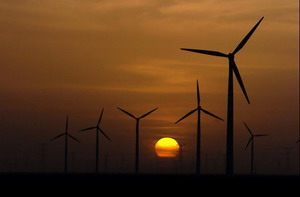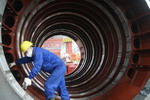Inflation reaches 3-yr high at 6.5%
Updated: 2011-08-10 09:21
By Li Xiang (China Daily)
|
|||||||||||
Turmoil in global financial markets may delay further rate increases
BEIJING - China's inflation rate hit a three-year high in July, posing challenges to policymakers amid turmoil in the global financial markets.
The consumer price index (CPI), a key gauge of inflation, rose 6.5 percent in July year-on-year, driven mainly by soaring food prices which climbed 14.8 percent from a year earlier, the National Bureau of Statistics (NBS) said on Tuesday.
Analysts said that the higher-than-expected inflation figure poses serious challenges to policymakers as escalating global financial turmoil complicates efforts to tackle domestic inflation.
Gloomy economic data from the United States and Europe may delay further interest rate hikes by the People's Bank of China until global financial markets stabilize, they said.
"While there had been strong expectations for another rate hike early this month following the release of the high inflation figure, the probability for that has been lowered somewhat, with policymakers likely to put the rate hike on hold until the global macroeconomic outlook settles," Alistair Thornton, an analyst with IHS Global Insight, said in a research note.
Investor confidence in a global economic recovery took a hard hit after international rating agency Standard & Poor's downgraded US credit rating from AAA to AA+. Global commodities prices tumbled with oil prices falling below $80 a barrel on Tuesday on the New York Mercantile Exchange, the lowest level in more than eight months.
China's Producer Price Index (PPI), an economic indicator of inflation at the wholesale level, jumped 7.5 percent year-on-year in July, according to the NBS. Analysts said that falling commodities prices may help relieve imported inflationary pressure.
"However, consumers may not benefit quickly because of the rigid domestic price-setting mechanism," said Yao Wei, an economist for China at the French bank, Societe Generale SA.
The National Development and Reform Commission, the country's top economic planner, brushed aside the possibility of any imminent cut in domestic retail fuel prices despite the more than 10 percent drop in global crude prices in the past week.
Economists forecast that the CPI will stay above 6 percent in the third quarter.
"This means that inflation, instead of an economic slowdown, remains the major risk," Qu Hongbin, chief economist for China and co-head of Asian economic research at HSBC, said.
The US may be poised to launch a third round of quantitative easing in an attempt to stimulate the economy. Two previous rounds lifted commodity prices, saw a surge of speculative capital inflow into China and increased inflationary pressure.
Premier Wen Jiabao urged "relevant countries" on Tuesday to implement responsible monetary and fiscal policies and reduce their deficits.
China will strike a balance between economic growth, restructuring and controlling inflation, Wen said at a State Council executive meeting.
Wen also called on the international community to work together to achieve a strong, sustained and balanced economic recovery.
"It is uncertain whether global commodity prices will rebound if the US launches a third round of quantitative easing, which will further complicate the domestic situation," Lu Zhengwei, chief economist at Industrial Bank, said. "So raising interest rates is still necessary if inflation remains high."
Global stock markets continued to fall on Tuesday after a panic sell-off triggered by the US downgrade. The benchmark Shanghai Composite Index declined 0.03 percent to close at 2,526.07 points.
"Our base-case view is that markets are overreacting, missing better growth ahead and becoming too negative on policy," Nomura Securities said in a report.
"We expect the market to initially react negatively but this is unlikely to trigger a 2008-style crisis and the decline is unlikely to last long," it said.
While policymakers in Beijing appeared to have limited room to maneuver on monetary policy, analysts said that China still has enough flexibility on fiscal policy to boost domestic consumption.
The construction of subsidized housing will start to gather steam in the coming months and a total of 700 billion yuan ($111 billion) is expected to be invested in the second half of the year. The income tax cut, effective on Sept 1, will also benefit consumption, tourism and healthcare sectors, analysts said.
"Although economic growth has slowed down in the first half of the year, the risk of a sharp economic decline is slim and investment will continue to grow fast," Xie Hongguang, the deputy chief of the NBS, said in his latest article.
Related Stories
China's July CPI rises to 37-month high 2011-08-09 11:53
China drains liquidity amid record inflation 2011-08-09 15:31
China likely to raise interest rates further 2011-08-08 09:05
Inflation can be tamed with right policy mix 2011-08-05 11:04
- July slowdown, but economy is still on track
- China inflation in mild, controllable range
- Inflation reaches 3-yr high
- Sinohydro, ICE to win $1.2b project
- GM crops still wait for harvest
- China Merchants Bank profit up 40%
- Tighter policies putting SMEs under pressure
- Chinese automakers hunt for sweet spot













